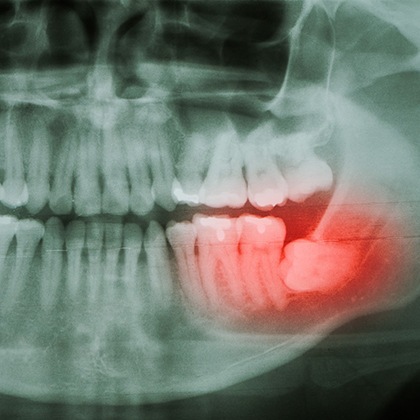Wisdom Teeth Removal
Preserving Smiles by Removing Problematic Teeth
If you’re between 16 and 25 and aren’t sure whether you have wisdom teeth or if they need to be removed, call our dental office today for an examination to learn more about wisdom tooth extractions in the Lake Nona Region. Our team can help determine whether they need to be removed, and whether they’re impacted or have already erupted, our experienced team of dentists can help boost your oral health and prevent additional concerns from arising down the road.
Why Choose Lake Nona Dental Group for Wisdom Tooth Extraction?
- Dental Sedation Available
- We Accept Dental Insurance
- Experienced & Knowledgeable Dentists
What are Wisdom Teeth?

Wisdom teeth, also known as third molars, typically grow in between 16 and 25 years old and are the last teeth to erupt. Some people aren’t born with any, while others can have one, two, three, or four of them. Whether we recommend extracting them depends on what risks they pose to your oral health down the road.
When Do Wisdom Teeth Need to Be Extracted?

Here are a few cases in which we may recommend removing wisdom teeth:
- They’re impacted below the gumline.
- They’re only partially emerged.
- They could cause orthodontic problems if they’re allowed to grow in.
- There’s not enough room in the jaw for them to grow in.
- You’re experiencing severe pain.
- They could lead to infections of the soft tissue in your mouth.
- They could increase your risk of developing gum disease or other oral problems down the road.
- The sacs that they’re grown in could result in cysts forming that could cause damage to the jawbone.
What to Expect From the Procedure

If your wisdom teeth have already erupted above the gumline, the treatment will be generally simple, similar to extracting any other tooth. Using an elevator and a pair of dental forceps, your dentist will gently lift the tooth out of its socket and wiggle it free of connective tissues. This will allow them to remove it from the socket and mouth.
If your wisdom teeth are impacted below the gumline, you will require a surgical procedure that is a little more complicated than the extraction described above. Our team will numb your mouth and administer dental sedation to ensure you remain comfortable throughout the extraction. To access the tooth, your dentist will create a small window in your gumline. They may also need to separate the tooth into multiple pieces to make it easier to remove. Once finished, they will close the extraction site to allow it to heal.
Recovering From Wisdom Tooth Extraction

Before your extraction, our team will provide you with detailed post-operative instructions to keep your blood clot intact and ensure you make a speedy and complication-free recovery. These instructions typically include the following:
- Do not spit, smoke, or drink out of a straw
- Place a cold compress on the cheek for 10 minutes on, 10 minutes off to help control swelling
- Avoid strenuous activity for the days following your procedure.
- Eat a soft diet for the days following your procedure
- Elevate your head while you sleep
- Take any prescribed or recommended medications to manage pain
- Call our office if you have any concerns, severe or sharp pain, or unusual symptoms
Understanding the Cost of Wisdom Tooth Extractions

Most people will need to have their wisdom teeth removed at some point, whether they’re impacted below the gumline, growing sideways, or there’s just not enough room in the mouth for them. Because each treatment is different based on a variety of factors, the cost can vary from case to case. Before your procedure, our team at Lake Nona Dental Group will provide you with a detailed cost estimate of your treatment so you know exactly what to anticipate. We’ll also speak with you about dental insurance coverage and financing options, if necessary.
Factors That Can Impact the Cost of Wisdom Tooth Extractions

The cost of wisdom tooth extraction in the Lake Nona Region can depend on multiple different factors, including:
- How many wisdom teeth need to be removed. Some people have all four of their wisdom teeth, while others only have one, two, or three.
- Whether the wisdom teeth are impacted. If the third molars are impacted below the gumline, you will need surgery to have them removed, which requires sedation and a more complicated procedure.
- If you need sedation. Even if you’re not having surgery, if you have severe dental anxiety or need sedation for other reasons, this service will incur a separate cost.
Does Dental Insurance Cover the Cost of Wisdom Tooth Extractions?

At Lake Nona Dental Group, we’re proud to be an in-network provider with Delta Dental and are happy to accept and file claims for our patients who are out-of-network as well. So, regardless of what type of PPO dental insurance plan you have, we’ll make sure that you receive the maximum reimbursement or pay as little out-of-pocket as possible.
In most cases, dental insurance plans will cover at least a portion of the cost of wisdom tooth extractions, but the exact amount will depend on your individual benefits. Our team will review your plan and coverage with you before your procedure so you know what you’ll be responsible for paying for out-of-pocket.
Making Wisdom Tooth Extractions More Affordable

If you have a large out-of-pocket cost that you’ll be required to cover or you’re uninsured, we’re happy to offer additional financing through CareCredit, Lending Club, and Proceed Finance. They will allow you to split up the cost of treatment into small, manageable monthly amounts at little-to-no interest. If you’re uninsured or underinsured, you may want to look into our in-house Membership Plan. Starting at $49 a month for adults, you can receive coverage for all of your basic preventive care as well as a 15% discount on all additional treatments, like wisdom tooth extractions.
Wisdom Tooth Extraction FAQs
Does everyone have wisdom teeth?
You may be surprised to learn that no, not everyone has wisdom teeth! In fact, between 20 and 25% of the population is born with anywhere from one to three of their wisdom teeth, while 35% are born without any of their wisdom teeth. However, it is most common for people to have all four wisdom teeth.
Is it painful to have wisdom teeth extracted?
The very first step that your dentist in the Lake Nona Region will take before your extraction is to numb your mouth using local anesthesia. If you’re having a more complicated surgery to remove impacted wisdom teeth, you’ll likely receive sedation as well. This will ensure that you feel comfortable and relaxed throughout the entire process. Depending on the type of sedation you receive, you also may not even remember the visit!
What’s the best age to get wisdom teeth removed?
While there’s no specific age when wisdom teeth should be removed, these are the last teeth that grow into the mouth, so many patients don’t begin noticing discomfort or other issues associated with the third molars until between the ages of 16 and 25. Usually, it’s in this age range that patients decide to remove their third molars. Typically, the longer you wait, the more complicated the case can become, as the teeth become more integrated with the nerves, tissue, and bone that surrounds them. In short, when your dentist recommends having them removed, it’s better to do it sooner rather than later.
Do wisdom teeth still need to be removed even if they don’t hurt?
Even if your wisdom teeth aren’t causing you any discomfort, there’s a variety of reasons why it may be best to still have them removed. Our team always takes the time to explain why we suggest a treatment, allowing you to feel confident and comfortable moving forward with our recommended plan. Typically, we recommend wisdom tooth extraction if there’s a risk of infection, cysts that can develop and damage the surrounding gums and jawbone, or if they can lead to future orthodontic concerns.
How long does wisdom tooth surgery take?
This really depends on the complexity of your individual case, but typically, it takes between 15 and 20 minutes to extract a wisdom tooth. That means that to remove all four, it could take up to 90 minutes. Some factors that can determine how long your procedure takes includes the location and position of the teeth, as well as whether or not they’re impacted below the gumline.


